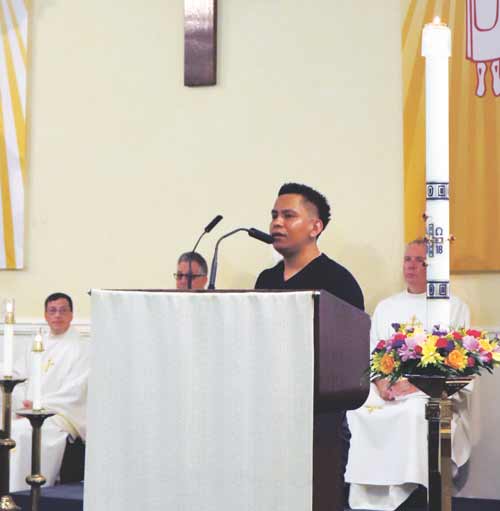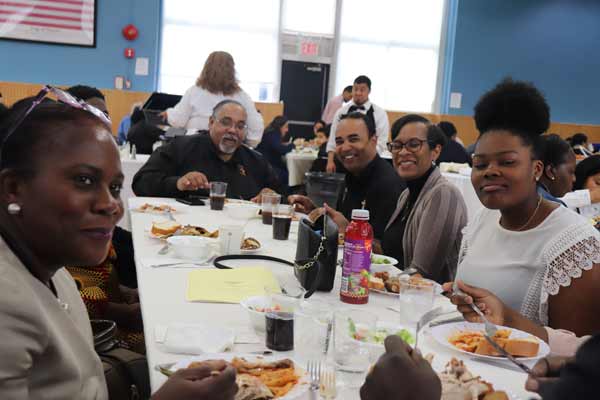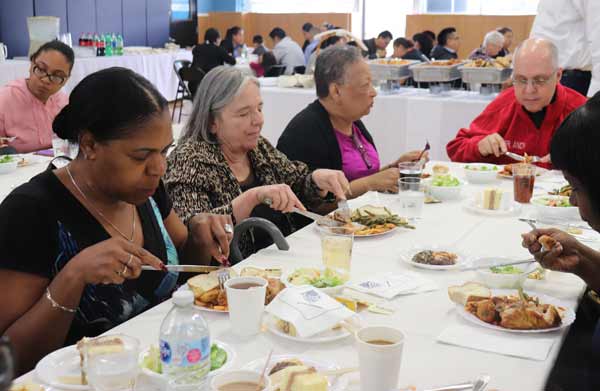
Bishop Nicholas DiMarzio expressed his support and love to the newest members of his family during the Diocesan Mass for Neophytes and Candidates, held for those who received the sacraments of initiation this past Easter.
“You are special to us,” he told the candidates on behalf of the diocese during his homily. “We know that God had chosen you for a special reason… Be guided by the Spirit that you received in Baptism and Confirmation.”
He told the congregation that filled Our Lady of Grace Church, Howard Beach, in the early morning of May 5, that they must trust God. Even though they may have their own dreams, aspirations and understandings of how they would like to live out their faith, that may not be want God has planned for them. He told them that they must be good examples to the whole world of what it means to seek the Father through the guidance of the Spirit.
However, he acknowledged, that conversion is a life-long process. Change is difficult for all. In difficult times he encouraged them to remember the day that they received their sacraments and the joy of the initial days of union with the Church.
“Memories sustain us,” he said. “Memories keep us going when the going gets tough.”
After Mass, two of the candidates gave testimonies of their conversions. Claudio Cielo Coyomani from Blessed Sacrament parish, Jackson Heights, said he would go to Mass before he decided to join the church in full union, but he did not experience it. He would not truly enter the communion of Saints and understand its sacredness. Now, he said, his life has changed; his heart softened. Now he is grateful.
“If God is love and if I can have Him a little bit more, I am thankful for that,” he said.
The other neophyte witness talk came from Beverley Riley, a member of St. Clare’s parish, Rosedale. She thanked the people who accompanied her through the process. She said every member of her parish supported her and her fellow neophytes throughout the process and sustained them on their journey. Now she is truly part of the parish community which she admires.
 “We see the light and we are trying to walk in it,” she said.
“We see the light and we are trying to walk in it,” she said.
Peter Bogada and Crystal Wolf from St. Sebastian parish, Woodside, gleamed with joy throughout the liturgy. They both said their joy radiates from the Eucharist.
Wolf had worshiped at different Protestant churches, but she was always looking for more, as if something was missing. Then she came to St. Sebastian’s and realized what her heart yearned for.
“The Eucharist and sacraments have fortified my faith,” she said. “This is like a whole different playing field.”
She had come to discover the warm motherly embrace of the Blessed Virgin Mary, who she discovered to be a most powerful ally in spiritual battles.
It was not always easy, Wolf said. There were times where she was beginning to succumb to her skepticism. What if Catholicism wasn’t that different after all? What if she would still not be whole? But her mentors assured her that things would be different when she received the Eucharist and things would be different with the protection of the mother of humanity. Now, she said, she can testify to the truth of their words.
Bogada said he felt it his responsibility to come to the diocesan Mass because he must nurture the gift that was bestowed upon him. He said the sacraments established a good root that can influence and help others, but he must care for it.
“My faith is with the Lord,” he said.
The keynote speaker gave a historical example of just how powerful a root from Christ can be.
William Keimi told the story of the first baptism in the Colonies. Of all 13, he said, Maryland was the only one established by Catholics, who landed on territory occupied by the Yaocomico tribe. The natives were intrigued by the new arrivals and graciously offered them a plot of land that would become St. Mary’s, a city that stands to this day.
 The Catholics and the Yaocomico got along fairly well and had a mutual understanding. Then one day, a young Yaocomico man killed a Catholic over a personal dispute. The Yaocomico caught the man and handed him over to the British authorities, who held a trial and condemned the young man to death. Both peoples agreed with this judgment. But a Jesuit priest did not think everything was done. He convinced the chief, who had gained some mastery of English, to speak with the young man and act as a translator.
The Catholics and the Yaocomico got along fairly well and had a mutual understanding. Then one day, a young Yaocomico man killed a Catholic over a personal dispute. The Yaocomico caught the man and handed him over to the British authorities, who held a trial and condemned the young man to death. Both peoples agreed with this judgment. But a Jesuit priest did not think everything was done. He convinced the chief, who had gained some mastery of English, to speak with the young man and act as a translator.
Keimi told the congregation that the historical records that depict the meeting between priest, chief and condemned are breathtaking. The priest, with the help of the chief, was able to evangelize to the condemned young men on the night before his death so truly that the young man answered “Yes” to the call of God and was baptized on the eve of his death. He was recorded as no longer being afraid or angry at his sentence, but welcoming it as a gateway to his heavenly home.
When the man died, the town asked for his body to be buried among his Christian family. It was done; and the Yaocomico people were astounded. Their culture had a strong preference towards the just and such an act of mercy intrigued them. They could not believe the Catholics would want a man that murdered one of their own to be buried beside them.
That started a conversion of the Yaocomico people that led to 4,000 being baptized. Keimi said that most of the people alive today who identify themselves as Yaocomico are Catholic.
The baptism of a condemned man led to the baptism of nearly 300 years of worth baptisms as Catholicism spread from St. Mary’s to what would become the first diocese in the Unites States, Baltimore, to the rest of the nation.
